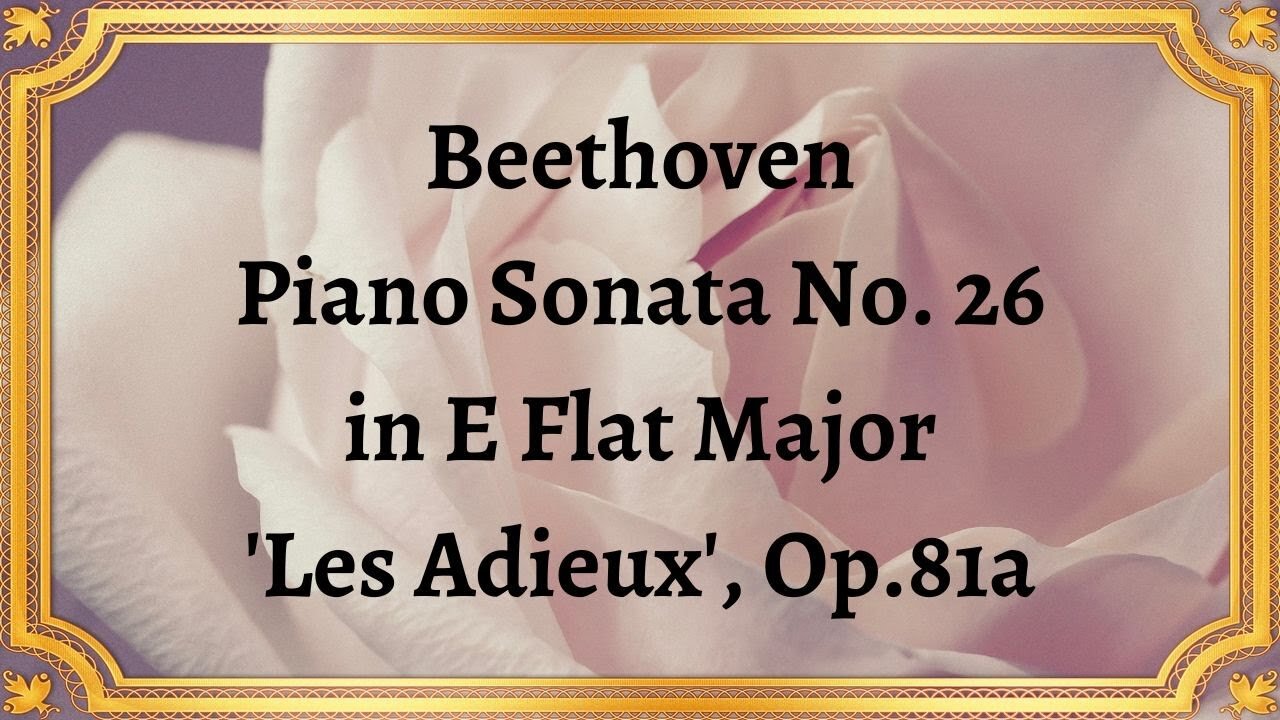Premium Only Content

Beethoven Piano Sonata №26 in E-flat major 'Les adieux', Op.81a
Beethoven Piano Sonata No. 26, also known as 'Les adieux', Op.81a, is a masterpiece by the renowned composer Ludwig van Beethoven.
Beethoven composed the 'Les adieux' Sonata between 1809 and 1810, during a tumultuous period in European history. Napoleon Bonaparte's forces had occupied Vienna, leading to the temporary departure of Archduke Rudolf, Beethoven's loyal patron and friend. It is believed that this event inspired Beethoven to compose the sonata as a farewell tribute to his dear friend.
The sonata follows the traditional three-movement structure: an expansive first movement, a slow and introspective second movement, and a lively and spirited final movement. This structure allows Beethoven to effectively convey his emotions and narrative throughout the piece.
Beethoven's 'Les adieux' Sonata is renowned for its profound emotional expressiveness. In the first movement, marked "Das Lebewohl" (The Farewell), the music captures the sorrow and longing associated with separation. The second movement, titled "Abwesenheit" (Absence), reflects Beethoven's feelings of emptiness and solitude. Finally, the third movement, "Das Wiedersehen" (The Return), represents the joyous reunion with Archduke Rudolf.
Beethoven's genius is evident in his innovative use of musical elements in this sonata. He employs daring harmonic progressions, unexpected modulations, and intricate melodic lines. The use of dramatic dynamic contrasts adds intensity and depth to the overall composition.
Beethoven's 'Les adieux' Sonata is a testament to the composer's ability to infuse his personal experiences and emotions into his music. The sonata serves as a musical diary, reflecting his profound sense of loss, longing, and eventual reunion.
Beyond its personal significance, the sonata holds a broader narrative of departure, absence, and return, which resonates with audiences across different cultures and time periods. It encapsulates the universal human experience of separation and reunion.
'Les adieux' Sonata demonstrates Beethoven's continued evolution as a composer and his groundbreaking approach to musical expression. It paved the way for future generations of composers to explore their emotions and tell compelling stories through their music.
Beethoven's Piano Sonata No. 26 in E-flat Major 'Les adieux', Op.81a, is a profound musical journey that encapsulates the composer's personal experiences and universal emotions of separation and reunion. Its structural brilliance, emotional expressiveness, and lasting significance have made it a beloved piece among musicians and music enthusiasts worldwide. Experience the power of Beethoven's 'Les adieux' Sonata, and allow its timeless melodies to transport you to a world of emotions and musical beauty.
I. Das Lebewohl (Adagio - Allegro) 00:00
II. Abwesenheit (Andante Espressivo) 06:05
III. Das Wiedersehen (Vivacissimamente) 09:38
#classical_music #Beethoven #sonata_for_piano
-
 2:31:02
2:31:02
vivafrei
11 hours agoEp. 258: Taibbi Sues for Defamation! Trump Tariff Madness! Russell Brand, Greenpeace Verdict & MORE!
94.1K82 -
 2:27:12
2:27:12
Nerdrotic
4 hours ago $6.44 earnedCIA JFK Assassination Documents | Forbidden Frontier 097
22.7K2 -
 1:22:13
1:22:13
Sarah Westall
3 hours agoTruth about Gila Monster Snake Venom & the Miracle of Peptides for Human Health w/ Dr. Diane Kazer
14.1K5 -
 LIVE
LIVE
Tundra Tactical
1 hour ago $0.40 earned$3200 ZEV HEARTBREAKER Contest!!!
520 watching -
 LIVE
LIVE
Adam Does Movies
10 hours ago $0.98 earnedAll The Big Movie Announcements From CinemaCon 2025- LIVE!
195 watching -
 1:07:30
1:07:30
Josh Pate's College Football Show
3 hours ago $0.50 earnedBig CFB Changes Coming | USC + Texas + Alabama In 2025 | Truth About Officiating | I Am Engaged
10.3K1 -
 4:43:40
4:43:40
Biscotti-B23
6 hours ago🔴 LIVE VIEWERS VS MEMBERS BEEF 🔥 FINDING A NEW MAIN ⚔ BLEACH REBIRTH OF SOULS
1.16K -
 LIVE
LIVE
DTDUBtv
3 hours agoOUTLAST TRIALS WITH SARAHSLOTH17
122 watching -
 LIVE
LIVE
Major League Fishing
5 days agoLIVE! - MLF Bass Pro Tour: REDCREST - Day 4
9,396 watching -
 LIVE
LIVE
EricJohnPizzaArtist
3 hours agoAwesome Sauce PIZZA ART LIVE Ep. #42: It’s Cartman!
216 watching